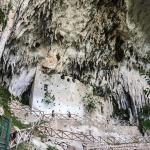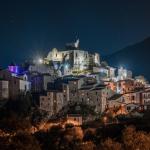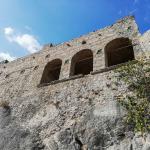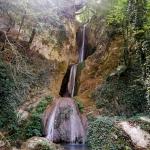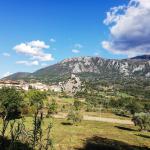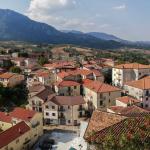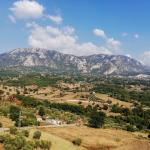The Municipality of Calabritto is located in the Sele Valley area, in the Picentini Mountains Natural Park. It's a town with 2,309 inhabitants, located 480 metres above sea level, at 66 km from Avellino. The territory extends for 56.33 sq km and the adjoining municipalities are: Acerno, Bagnoli Irpino, Caposele, Lioni, Senerchia and Valva. It's crossed by the Sele river and the Rio Zagarone.
The etymology of the name seems to come from a legend: a woman named Britta (for some of easy virtue, for others the daughter of an authentic feudal lord, for others an innkeeper), called, depending on the version of the customers of the inn or by the soldiers of Hannibal, with the shout "Cala Britta". The inhabitants are called Calabrittani and Saint Joseph is their patron.
PLACES OF INTEREST
- Medieval village and castle of Quaglietta - An important historical testimony of the Lombard domination in Irpinia, it's located 7 km from the centre and houses the "Quaglietta" Albergo Diffuso hotel
- Calabritto Waterfalls - Naturalistic area, consisting of the main 14 waterfalls formed by the Rio Zagarone and its tributaries
- Sanctuary of Maria SS. della Neve (Our Lady of the Snow) - Place of worship founded in the 15th century, which dominates the entire Sele Valley, at 945 meters above sea level. It's linked to an ancient popular legend
- Rock Church of Madonna del Fiume (Our Lady of the River) - Located inside a karst cave, it's dedicated to the protector of pregnant women and it is a tradition that, on Easter Monday, they go there to pray
- Church of Santa Maria di Costantinopoli (Our Lady of Constantinople) - Place of ancient devotion and faith, inside there is a painting of the black Madonna, imported by the Basilian monks around 1200
- Church of the SS. Trinità (Holy Trinity) - Mother Church, built following the 1980 earthquake, not far from the central square of the town
- Chapel of Maria SS. di Grienzi - Inaugurated in 1751, it houses the statue of the Madonna particularly venerated in Calabritto
- Papio Palace - Located in Piazza Matteotti, the current building dates back to the reconstruction carried out after the earthquake of November 1980
- Church of Santa Maria delle Grazie (Holy Mary of Graces) - Among the oldest in the town, it was the spiritual centre of a monastery, perhaps of Basilian monks, of which the remains can still be glimpsed
- Church of San Rocco (Saint Roch) - Destroyed by the earthquake of 1980 and rebuilt from the foundations, it preserves only the original stone portal
- Other churches - Church of Madonna del Carmine (Our Lady of Mount Carmel), Church of S. Pietro (Saint Peter)
EVENTS
- Bell ringing along the town - In honour of Saint Anthony the Abbot, on he 17th of January, the inhabitants knock from house to house to ask for gifts
- Saint Joseph Bonfires - They are held on the 19th of March, in honour of the patron saint, and include the lighting of bonfires in the districts of the town
- Feast of Madonna di Grienzi - Festival held on the last Sunday of June, after a night pilgrimage of over three hours of walking, reaching the Sanctuary of the Madonna di Grienzi
- Feast of Saint Joseph and Our Lady of the Snow - Patronal feast of the town, very felt by the faithful, it takes place in the last weekend of July
- Pilgrimage to Our Lady of the Snow - It takes place on the 5th of August, with arrival at the Sanctuary of the Madonna della Neve
- Chestnut Festival - Food and wine event that takes place in October, in which it's possible to taste typical local products and traditional dishes
TYPICAL FOOD AND PRODUCTS
- PAT quagliettani peppers - A particular type of peppers, also called "papazzi", grown in the middle-upper Sele Valley, especially in the town of Quaglietta
- Quaglietta ginger ravioli PAT - Square or round egg pasta sheets, filled with ricotta, eggs, grated cheese, parsley and "zenzifero" (the latter is an aromatic native mint)
- Menesta ‘mmaretata - Escarole and beans, possibly cooked in an earthenware container (called pignata or pignatiello), joined ('mmaretati) with poor cuts of the pig, i.e. legs, ears, snout, poor sausage
- Trout - Bred along the river Sele, thanks to the presence of fish farms in the area
- Cicirieddi - Typical local dessert made from fried cubes and honey
- Caciocavallo Silano PDO - Semi-hard cheese, with spun curd, produced with milk from different breeds of cows, including Podolica
FUN FACTS
According to a local tradition, part of the inhabitants are descendants of Spartacus' troops, who managed to escape the Romans at the mouth of the Sele and definitively defeated by them "ad caput silaris fluminis", that is, in today's Caposele.
HISTORICAL NOTES
The Upper Sele Valley was deeply marked by the passage of the various lineages that settled there in ancient times. However, in Calabritto there is no real archaeological area and the finds found in Piedelmonte were lost due to the earthquake of the 23rd of November 1980.
Calabritto was closely linked to Caposele, having territorial borders in common; in 1279, however, Caposele asked for the division.
The conformation of the town changed profoundly after the plague of 1656, with an increase in the population and a new orientation of the concentration of the town towards the castle and towards the Mother Church of the Holy Trinity.
In 1807 Calabritto passed from the Citra Principality (of which it was part from 1229) to the Ultra Principality.
Among the events that marked the territory, we point out the annexation of the nearby town of Quaglietta, in 1928, which became a hamlet of it, and the severe damage caused by a violent bombing during the Second World War and by terrible earthquakes, such as that of 1980.
Have you ever heard of aquatrekking? An excursion to be practised in small groups, in which the aquatic element is central, and Calabritto is certainly ideal for practising it due to its natural environments that are intact from an environmental point of view
Calabritto
Via Salvador Allende, 83040, Calabritto AV, Italia
Events
On 21 December 2024 cooking workshops, theatrical performances, stands of typical products,…
On March 19, 2025 faith, taste and music in honor of the Saint
-
10th and 11th May 2025 3rd edition of the event that combines good local cuisine with trekking
-
A tradition that has been handed down from generation to generation in Calabritto, the…
-
A combination of devotion, folklore and fun, Saint Joseph's Bonfires are one of the most…
-
On 4 and 5 October 2023, two days where the villages of the Campania hinterland will be…
Featured places
Corso del Popolo, 83040 Quaglietta AV, Italia
A sign of age-old charm, unchanged over time, the medieval village of Quaglietta is an…
Località Ponticchio, 83040 Calabritto AV Italia
Located inside a karstic cave, known for its spectacular limestone formations, the rock Church…
Via Costantinopoli, 83040 Calabritto AV, Italia
A place of ancient devotion and faith, the Church of Santa Maria di Costantinopoli in…
Cappella dei Grienzi, Calabritto, 83040, AV
The characteristic mountain church, surrounded by enchanting nature
Chiesa madre della Santissima Trinità, 83040 Calabritto AV
A new religious building built following the terrible earthquake that hit Irpinia on 23…
Via Policchio, 83040 Calabritto AV, Italia
The Zagarone torrent flows through Calabritto, whose waters, together with those of its…
Did you like it? Leave a review
Your opinion is important! It will be visible after approval by the editorial staff.
To post a comment you must be an authenticated user. Log in with Social Login
